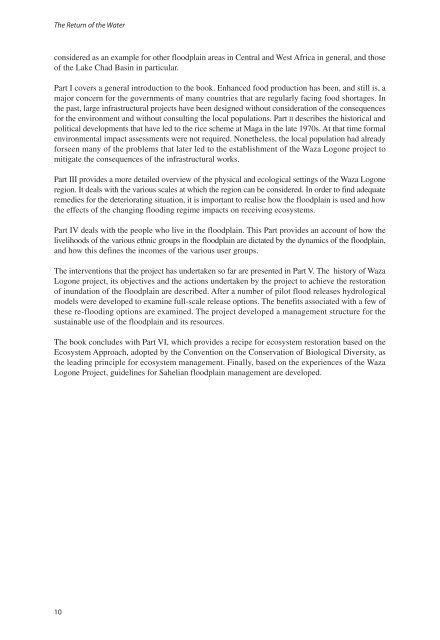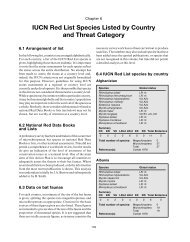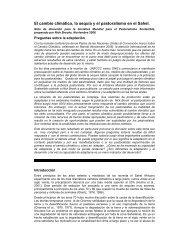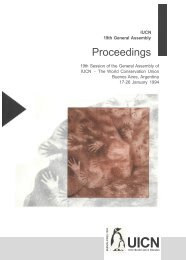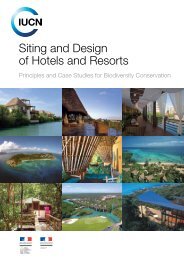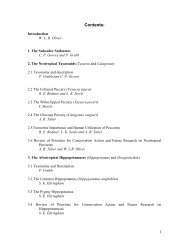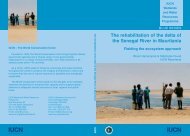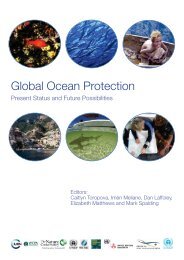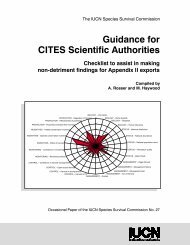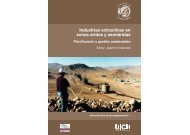The return of the water - IUCN
The return of the water - IUCN
The return of the water - IUCN
Create successful ePaper yourself
Turn your PDF publications into a flip-book with our unique Google optimized e-Paper software.
<strong>The</strong> Return <strong>of</strong> <strong>the</strong> Water<br />
considered as an example for o<strong>the</strong>r floodplain areas in Central and West Africa in general, and those<br />
<strong>of</strong> <strong>the</strong> Lake Chad Basin in particular.<br />
Part I covers a general introduction to <strong>the</strong> book. Enhanced food production has been, and still is, a<br />
major concern for <strong>the</strong> governments <strong>of</strong> many countries that are regularly facing food shortages. In<br />
<strong>the</strong> past, large infrastructural projects have been designed without consideration <strong>of</strong> <strong>the</strong> consequences<br />
for <strong>the</strong> environment and without consulting <strong>the</strong> local populations. Part II describes <strong>the</strong> historical and<br />
political developments that have led to <strong>the</strong> rice scheme at Maga in <strong>the</strong> late 1970s. At that time formal<br />
environmental impact assessments were not required. None<strong>the</strong>less, <strong>the</strong> local population had already<br />
forseen many <strong>of</strong> <strong>the</strong> problems that later led to <strong>the</strong> establishment <strong>of</strong> <strong>the</strong> Waza Logone project to<br />
mitigate <strong>the</strong> consequences <strong>of</strong> <strong>the</strong> infrastructural works.<br />
Part III provides a more detailed overview <strong>of</strong> <strong>the</strong> physical and ecological settings <strong>of</strong> <strong>the</strong> Waza Logone<br />
region. It deals with <strong>the</strong> various scales at which <strong>the</strong> region can be considered. In order to find adequate<br />
remedies for <strong>the</strong> deteriorating situation, it is important to realise how <strong>the</strong> floodplain is used and how<br />
<strong>the</strong> effects <strong>of</strong> <strong>the</strong> changing flooding regime impacts on receiving ecosystems.<br />
Part IV deals with <strong>the</strong> people who live in <strong>the</strong> floodplain. This Part provides an account <strong>of</strong> how <strong>the</strong><br />
livelihoods <strong>of</strong> <strong>the</strong> various ethnic groups in <strong>the</strong> floodplain are dictated by <strong>the</strong> dynamics <strong>of</strong> <strong>the</strong> floodplain,<br />
and how this defines <strong>the</strong> incomes <strong>of</strong> <strong>the</strong> various user groups.<br />
<strong>The</strong> interventions that <strong>the</strong> project has undertaken so far are presented in Part V. <strong>The</strong> history <strong>of</strong> Waza<br />
Logone project, its objectives and <strong>the</strong> actions undertaken by <strong>the</strong> project to achieve <strong>the</strong> restoration<br />
<strong>of</strong> inundation <strong>of</strong> <strong>the</strong> floodplain are described. After a number <strong>of</strong> pilot flood releases hydrological<br />
models were developed to examine full-scale release options. <strong>The</strong> benefits associated with a few <strong>of</strong><br />
<strong>the</strong>se re-flooding options are examined. <strong>The</strong> project developed a management structure for <strong>the</strong><br />
sustainable use <strong>of</strong> <strong>the</strong> floodplain and its resources.<br />
<strong>The</strong> book concludes with Part VI, which provides a recipe for ecosystem restoration based on <strong>the</strong><br />
Ecosystem Approach, adopted by <strong>the</strong> Convention on <strong>the</strong> Conservation <strong>of</strong> Biological Diversity, as<br />
<strong>the</strong> leading principle for ecosystem management. Finally, based on <strong>the</strong> experiences <strong>of</strong> <strong>the</strong> Waza<br />
Logone Project, guidelines for Sahelian floodplain management are developed.<br />
10


